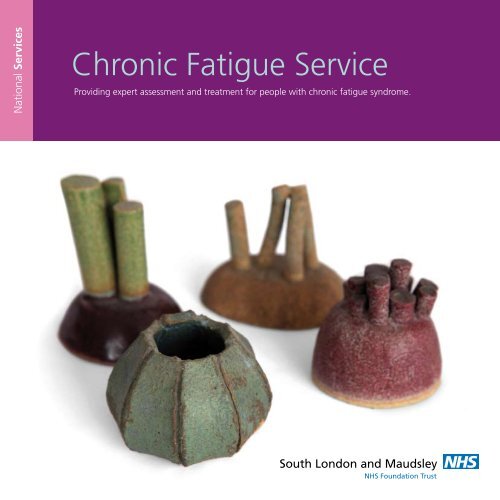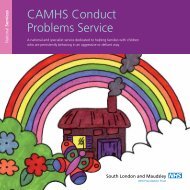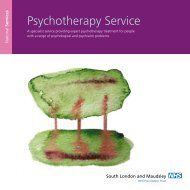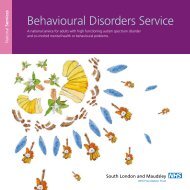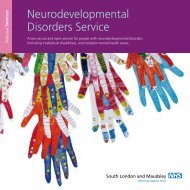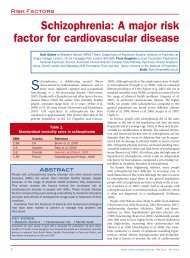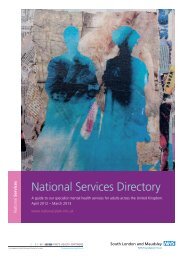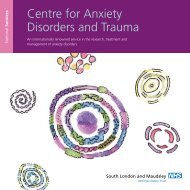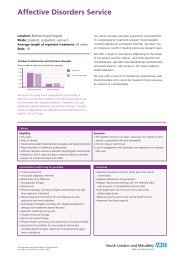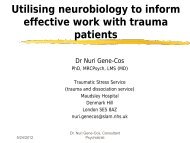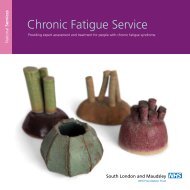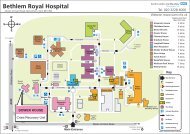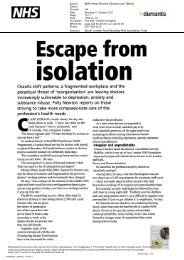Chronic Fatigue Service booklet - SLaM National Services
Chronic Fatigue Service booklet - SLaM National Services
Chronic Fatigue Service booklet - SLaM National Services
You also want an ePaper? Increase the reach of your titles
YUMPU automatically turns print PDFs into web optimized ePapers that Google loves.
<strong>National</strong> <strong>Service</strong>s<br />
<strong>Chronic</strong> <strong>Fatigue</strong> <strong>Service</strong><br />
Providing expert assessment and treatment for people with chronic fatigue syndrome.
South London and Maudsley NHS Foundation Trust<br />
» My sessions with my therapist have been invaluable. They have<br />
been underpinned by a spirit of empathy, collaboration and<br />
respect. Returning to work, managing the phased return and<br />
handling work in a healthy way have been the main themes<br />
around which treatment has been centred…my return to<br />
work would have been far more difficult without her help and<br />
support and to be honest I’m not certain I would have managed<br />
it successfully. « Alice<br />
Cover: ceremics by James Tanner, a former patient and current volunteer at the Bethlem Royal Hospital, 2011.<br />
2
<strong>National</strong> <strong>Service</strong>s: <strong>Chronic</strong> <strong>Fatigue</strong> <strong>Service</strong><br />
Contents<br />
<strong>Service</strong> overview 4<br />
Our philosophy 5<br />
Who is our service for 6<br />
Interventions 8<br />
Our care pathway 12<br />
Outcomes 14<br />
Research 16<br />
Our facilities 17<br />
Our team 18<br />
Training and consultancy 21<br />
Case studies 22<br />
Referring to our service 26<br />
3
South London and Maudsley NHS Foundation Trust<br />
<strong>Service</strong> overview<br />
Our service provides assessment and treatment for adults and adolescents with chronic fatigue<br />
syndrome (CFS), also known as myalgic encephalomyelitis, and for patients with medically<br />
unexplained symptoms.<br />
We offer evidence-based treatment that is routinely evaluated.<br />
Our aim is to increase the person’s functioning and reduce the<br />
severity and impact of their symptoms.<br />
We also offer assessment and treatment for people with<br />
fatigue associated with chronic diseases like rheumatoid<br />
arthritis, multiple sclerosis, HIV or cancer.<br />
Our team is at the forefront of research, continually testing<br />
new treatments and innovative ways of delivering them.<br />
King’s Health Partners<br />
Our service is part of the Psychological Medicine Clinical<br />
Academic Group. <strong>SLaM</strong> has joined with King’s College<br />
London, Guy’s and St Thomas’ NHS Foundation Trust and<br />
King’s College NHS Foundation Trust to establish King’s<br />
Health Partners, an Academic Health Sciences Centre. King’s<br />
Health Partners involves bringing clinical care, research and<br />
education much more closely together. Our aim is to reduce<br />
the time it takes for research discoveries and medical<br />
breakthroughs to become routine clinical practice. This will<br />
lead to better care and treatment for patients.<br />
Visit www.kingshealthpartners.org for more information.<br />
4
<strong>National</strong> <strong>Service</strong>s: <strong>Chronic</strong> <strong>Fatigue</strong> <strong>Service</strong><br />
Our philosophy<br />
Many people we see have been told that their symptoms don’t exist and some have been<br />
given negative messages about the possibility of improvement and recovery.<br />
The focus of our approach is to improve the quality of people’s<br />
lives, reduce their fatigue and help them to fully engage in life.<br />
Our dedicated team offer cognitive behavioural therapy (CBT)<br />
and graded exercise therapy (GET) which are tailored to the<br />
needs of each person.<br />
Treatment is effective, with around 65% of people improving<br />
with either CBT or GET, and around 25% of people making<br />
a full recovery.<br />
» Coming to the service changed our lives.<br />
It was unimaginable a year ago that<br />
she would have been back at school. We<br />
thank you, more than we will ever be<br />
able to say. « Katherine, parent<br />
5
South London and Maudsley NHS Foundation Trust<br />
Who is our service for<br />
Our service is for people with clinically significant fatigue or medically unexplained physical<br />
symptoms. We help to improve their quality of life through a combination of rehabilitative<br />
treatments, including forms of CBT and graded exercise therapy.<br />
Eligibility<br />
›› 14+ years (we work in conjunction<br />
with our child and adolescent service)<br />
›› Male or female<br />
›› Long lasting fatigue<br />
›› Profound disability<br />
›› Disturbed sleep pattern<br />
» She had been virtually housebound<br />
for five years, living in<br />
two rooms, unable to go out or<br />
even sit up for longer than a few<br />
minutes. Her quality of life was<br />
extremely poor and I was a fulltime<br />
carer. After 15 months,<br />
although not yet fully recovered,<br />
she transformed beyond our<br />
wildest dreams. She is back at<br />
school and loving it, has friends<br />
and can lead a very gentle, but<br />
somewhere near normal, life<br />
again. A very big thank you. «<br />
Sally, parent<br />
6
<strong>National</strong> <strong>Service</strong>s: <strong>Chronic</strong> <strong>Fatigue</strong> <strong>Service</strong><br />
7
South London and Maudsley NHS Foundation Trust<br />
Interventions<br />
We provide a range of interventions to help improve our patients’ quality of life.<br />
These may include:<br />
›› Diagnostic assessment<br />
›› Routine blood tests<br />
›› CBT<br />
›› Graded exercise therapy<br />
Specialist assessment<br />
An assessment to confirm the diagnosis is conducted, including<br />
a medical history, assessment of mental state and blood tests.<br />
We look for any other causes of fatigue or co-morbidity with<br />
other illnesses and discuss therapeutic options.<br />
Initial investigations may include urinalysis, full blood count,<br />
urea and electrolytes, liver function tests, calcium, thyroid<br />
function, erythrocyte sedimentation rate, C-reactive protein,<br />
creatine kinase, and glucose or coeliac serology, for example<br />
antigliadin antibodies.<br />
Self-help treatment<br />
Each patient is allocated a therapist at their assessment,<br />
and given self-help material to help them build on their<br />
self-management while they wait for CBT or GET to begin.<br />
Following this treatment, some people may not require CBT<br />
or GET with a therapist.<br />
Cognitive behavioural therapy<br />
CBT is an effective treatment for people with mild to moderate<br />
CFS and ME, and for those with medically unexplained symptoms.<br />
CBT home-based sessions are offered to people who are<br />
severely affected by their illness and are too ill to attend the<br />
unit. It is a collaborative treatment, where the patient and<br />
a CBT therapist work together using a variety of techniques<br />
and strategies which adhere to empirically validated therapy<br />
protocols. Interventions are adapted to the needs of the<br />
patient and may include establishing a consistent pattern<br />
of activity and rest, gradual increase in activity levels, sleep<br />
management and addressing unhelpful thinking patterns.<br />
Family-focused CBT<br />
This approach is facilitated by members of the family and the<br />
person is encouraged to engage in activities they find difficult,<br />
like seeing friends and going to school. The whole family are<br />
supported in making changes that are necessary to facilitate<br />
a return to education.<br />
We have an ongoing clinical and research service for 11 to 18<br />
year olds with CFS and ME. Our research results are utilised<br />
in improving our treatment.<br />
Graded exercise therapy<br />
GET is regular physical activity or exercise, starting at a baseline<br />
level and gradually increasing until people’s goals are achieved.<br />
The duration of exercise is gradually increased to 30 minutes,<br />
and then the intensity is increased over time, aiming for a heart<br />
rate of 60-75 per cent. Stretches and strengthening exercises<br />
are also included in the program.<br />
This type of therapy has been found to improve functioning,<br />
decrease disability and symptoms through carefully monitored,<br />
graded increases in physical activity and exercise.<br />
8
<strong>National</strong> <strong>Service</strong>s: <strong>Chronic</strong> <strong>Fatigue</strong> <strong>Service</strong><br />
» Her health has improved faster than we could have hoped for. I would hesitate to say<br />
she is cured, but I feel that we are over the worst and are in a better position to deal<br />
with any setbacks that we might encounter in the future. « Carer<br />
9
South London and Maudsley NHS Foundation Trust<br />
Our care model<br />
FAMILY AND CARERS<br />
›› Involvement in treatment<br />
›› Advice and support on how to<br />
help with recovery<br />
›› Education about CFS or fatigue<br />
associated with long-term<br />
health conditions<br />
ASSESSMENT<br />
›› Assessment of possible physical causes<br />
›› Assessment of psychological factors<br />
›› Routine blood investigations<br />
›› Formulation including biological,<br />
psychological and social factors<br />
›› Comprehensive report<br />
THERAPIES<br />
›› Evidence-based treatments<br />
›› Individual treatment plan<br />
›› Progress reviews using validated<br />
clinical measures<br />
›› Home visits and telephone therapy<br />
›› CBT<br />
›› GET<br />
›› Family-focused CBT for adolescents<br />
PATIENT<br />
›› Understanding why fatigue has<br />
developed and what maintains<br />
symptoms<br />
›› Promoting a healthy lifestyle by<br />
introducing new ways of thinking<br />
about exercise, diet and work<br />
›› Increasing independence by<br />
setting achievable goals<br />
›› Broadening social support<br />
›› Improving quality of life<br />
EDUCATION AND<br />
VOCATIONAL OPPORTUNITIES<br />
›› Advice and support in planning<br />
return to work or education<br />
›› Liaise with employers, human<br />
resources and occupational health<br />
staff as required<br />
WORKING WITH OTHERS<br />
›› Discharge planning<br />
›› Liaising with other health and<br />
social care providers<br />
›› Working collaboratively with<br />
other specialist services<br />
›› Providing information, reports<br />
and liaison as appropriate, for<br />
work or housing purposes<br />
10
<strong>National</strong> <strong>Service</strong>s: <strong>Chronic</strong> <strong>Fatigue</strong> <strong>Service</strong><br />
11
South London and Maudsley NHS Foundation Trust<br />
Our care pathway<br />
Referral received and<br />
funding approval<br />
Criteria not met<br />
Assessment<br />
Recommend<br />
treatment package<br />
Treatment<br />
Review<br />
Discharged with<br />
care plan approach<br />
Follow-up at three<br />
and six months<br />
12
<strong>National</strong> <strong>Service</strong>s: <strong>Chronic</strong> <strong>Fatigue</strong> <strong>Service</strong><br />
13
South London and Maudsley NHS Foundation Trust<br />
Outcomes<br />
The Chalder <strong>Fatigue</strong> Scale is the primary outcome measure used by our service. We also<br />
measure disability, mood, work-related outcomes and illness perceptions.<br />
Expected outcomes may include:<br />
›› Resuming daily activities<br />
›› Establishing a sleep routine<br />
›› Addressing associated anxiety or depression<br />
›› Challenging problematic beliefs which interfere<br />
with progress, which may relate to the rehabilitation<br />
programme, perfectionism or low self-esteem<br />
›› Making lifestyle changes which may help to prevent<br />
relapse at a later date<br />
Graph 1 This graph demonstrates our patient’s improvement<br />
over time, after a course of CBT.<br />
Graph 2 This graph shows a comparison of work and social<br />
adjustment scores before and after therapy. A significant<br />
improvement was seen post-therapy and continual improvement<br />
was noted up to six months after therapy was completed.<br />
1. <strong>Chronic</strong> <strong>Fatigue</strong> questionnaire scores<br />
SCORE ON FATIGUE QUESTIONNAIRE<br />
12<br />
10<br />
8<br />
6<br />
4<br />
2<br />
Graph 3 We compared the effectiveness of family-focused<br />
CBT and psychoeducation for adolescents with CFS. We found<br />
that those people who received CBT were attending school<br />
more than those people who had received psychoeducation<br />
at discharge, but at the final follow-up everyone was attending<br />
school for a similar amount of time.<br />
0<br />
PRE-THERAPY<br />
POST-THERAPY<br />
6 MONTH<br />
FOLLOW-UP<br />
Randomised controlled trial<br />
Clinical practice<br />
14
<strong>National</strong> <strong>Service</strong>s: <strong>Chronic</strong> <strong>Fatigue</strong> <strong>Service</strong><br />
[ “57% of our patients said they were very much better, or much better at the<br />
end of treatment.” ] Quarmby et al 2007<br />
2. Work and social adjustment scale scores 3. School attendance in adolescents with CFS<br />
SCORE ON WORK AND SOCIAL ADJUSTMENT SCALE<br />
6<br />
PROPORTIONAL SCHOOL ATTENDANCE<br />
8<br />
6<br />
5<br />
4<br />
2<br />
4<br />
PRE-THERAPY<br />
POST-THERAPY<br />
6 MONTH<br />
FOLLOW-UP<br />
0<br />
5 MONTH<br />
FOLLOW-UP<br />
10 MONTH<br />
FOLLOW-UP<br />
15 MONTH<br />
FOLLOW-UP<br />
20 MONTH<br />
FOLLOW-UP<br />
MONTHS FROM RANDOMISATION<br />
Family-focused CBT<br />
Behaviourally-orientated psychoeducation<br />
15
South London and Maudsley NHS Foundation Trust<br />
Research<br />
Our partnership with King’s College London has pioneered some of the leading programmes<br />
in CFS, and we are continually improving our understanding of chronic fatigue and medically<br />
unexplained symptoms to develop new and better treatments.<br />
Our ongoing research topics include:<br />
›› A pilot study evaluating the treatment of severely affected<br />
house-bound adolescents with CFS<br />
›› A prospective study examining predictors and moderators<br />
of outcomes after a course of CBT for patients with CFS<br />
›› A prospective study examining the role of cognitive and<br />
behavioural factors in the development and perpetuation<br />
of fatigue in people with breast cancer<br />
›› A prospective study examining a psycho-physiological<br />
model of CFS in adolescents<br />
›› A prospective study examining the role of cognitive and<br />
behavioural factors in the development and perpetuation<br />
of fatigue in people with rheumatoid arthritis<br />
16
<strong>National</strong> <strong>Service</strong>s: <strong>Chronic</strong> <strong>Fatigue</strong> <strong>Service</strong><br />
Our facilities<br />
Our service is based at the historic Maudsley Hospital, which is internationally renowned<br />
for excellence in research, treatment and teaching in mental health. The hospital is based<br />
in South London and has close links to public transport.<br />
Our service is located on the first floor of Mapother House,<br />
and is accessible by lift. We have 11 treatment rooms, which<br />
provide our patients with the privacy to ensure they are<br />
treated with dignity and respect.<br />
» My head is a lot clearer 80%<br />
of the time and my attitude<br />
is 100% better. « Ashley<br />
17
South London and Maudsley NHS Foundation Trust<br />
Our team<br />
Our multidisciplinary team includes psychiatrists, psychologists, physiotherapists,<br />
psychotherapists, doctors and researchers.<br />
Professor Trudie Chalder PhD, MSc, SRN, RMN, Cert in Beh Psychotherapy<br />
Director<br />
Professor Chalder is the director of the <strong>Chronic</strong> <strong>Fatigue</strong> <strong>Service</strong><br />
as well as a professor of cognitive behavioural psychotherapy<br />
with the Department of Psychological Medicine, at the<br />
Institute of Psychiatry, King’s College London.<br />
Other roles<br />
Professor Chalder gives national and international lectures<br />
on CFS. She has been closely involved in developing and<br />
evaluating treatments for adolescents and adults with CFS.<br />
These studies have contributed to recommendations made<br />
in the NICE guidelines.<br />
Professor Chalder has also taken part in international<br />
collaborations with Professor Hege Erikson (Norway) and<br />
Dr John Wells (Ireland).<br />
Background<br />
Professor Chalder qualified as a registered general nurse in<br />
1981 at Grimsby General Hospital. In 1984, she completed her<br />
registered mental nurse training at Tooting Bec Hospital, London.<br />
She completed her Master of Science (MSc) in 1990 at City<br />
University in London. In 1998, she went onto complete her PhD<br />
at the Institute of Psychiatry, King’s College London.<br />
Research<br />
Professor Chalder’s research interests are focused on developing<br />
cognitive behavioural models and treatments for medically<br />
unexplained symptoms and symptoms related to chronic disease.<br />
18
<strong>National</strong> <strong>Service</strong>s: <strong>Chronic</strong> <strong>Fatigue</strong> <strong>Service</strong><br />
Dr Alastair M Santhouse MA, MB BChir, MRCP, MRCPsych<br />
Consultant Psychiatrist<br />
Dr Santhouse is a consultant psychiatrist at <strong>SLaM</strong>. He also<br />
works at Guy’s Hospital, where he looks after the mental<br />
health needs of patients with concurrent physical and<br />
psychological problems.<br />
Other roles<br />
Dr Santhouse is the Trust lead on the implementation<br />
of the NICE guidelines on CFS.<br />
Background<br />
Dr Santhouse trained at Cambridge University and then Guy’s<br />
Hospital. He joined the medical rotation at the Royal London<br />
Hospital and gained membership at the Royal College<br />
of Physicians (MRCP). From here, Dr Santhouse trained in<br />
psychiatry at the Maudsley Hospital and became a member<br />
of the Royal College of Psychiatrists (MRCPsych). He was<br />
appointed as a consultant in psychological medicine in 2003.<br />
Research<br />
Dr Santhouse has regular speaking engagements related<br />
to toxicology courses for emergency physicians, and lectures<br />
and teaches medical students.<br />
19
South London and Maudsley NHS Foundation Trust<br />
Our team continued<br />
Professor Simon Wessely<br />
MA, BM B Ch, MSc, MD, FRCP, FRCPsych, F Med Sci<br />
Director of the King’s Centre for Military Health Research<br />
Professor of Psychiatry<br />
Professor Wessely is head of the Department of Psychological<br />
Medicine at the Institute of Psychiatry, King’s College<br />
London, and an honorary consultant liaison psychiatrist<br />
for the Trust. He is also the director of the King’s Centre<br />
for Military Health Research.<br />
Background<br />
Professor Wessely has specialised in the treatment of<br />
unexplained symptoms and syndromes, including CFS,<br />
for more than 25 years. In 1994, he established the Trust’s<br />
<strong>Chronic</strong> <strong>Fatigue</strong> <strong>Service</strong>, the first ever NHS facility delivered<br />
solely for people with the disorder. The service is one of the<br />
largest specialising in the condition and has won local awards<br />
for innovation. It played a central role in developing, researching<br />
and then demonstrating the success of CBT for CFS – one of<br />
only two treatments endorsed by NICE to manage and treat<br />
the illness.<br />
Research<br />
Professor Wessely remains active in research and has authored<br />
or co-authored more than 550 publications. Apart from CFS<br />
and military health, his areas of research cover subjects like<br />
irritable bowel syndrome, screening, liaison psychiatry,<br />
deliberate self-harm and suicide, crime and schizophrenia,<br />
the history of psychiatry, psychological debriefing and stress<br />
management, post-traumatic stress disorder, psychological<br />
reactions to terrorism, mobile phone sensitivity, and health<br />
service research.<br />
20
<strong>National</strong> <strong>Service</strong>s: <strong>Chronic</strong> <strong>Fatigue</strong> <strong>Service</strong><br />
Training and consultancy<br />
Our team is experienced in providing national and international training in the assessment and<br />
treatment of CFS and medically unexplained symptoms.<br />
We offer training and consultancy in the assessment,<br />
treatment and management of CFS and fatigue in chronic<br />
illness. Our training is suitable for psychiatrists and mental<br />
health professionals, and is available at the basic or advanced<br />
levels. We also have experience in teaching skills to nonmental<br />
health professionals. Bespoke training to suit different<br />
services is also available.<br />
The following workshops may be provided:<br />
››<br />
››<br />
››<br />
››<br />
CFS<br />
<strong>Fatigue</strong> in chronic diseases<br />
CBT for chronic medical problems<br />
Medically-unexplained symptoms<br />
For more information about training contact Suzanne Roche<br />
on 020 3228 5075 or email suzanne.roche@slam.nhs.uk<br />
» The staff are very professional, patient,<br />
understanding, noticeably kind and tailor<br />
the treatment for each person, with<br />
attention to detail and quality care. « James<br />
21
South London and Maudsley NHS Foundation Trust<br />
Caleb<br />
“ I was getting a lot of illnesses, off and on.”<br />
I was doing my GCSEs at school and getting ill a lot.<br />
I had two weeks of glandular fever and never really<br />
recovered from that. The tiredness and achiness<br />
continued and, though I got through my exams,<br />
I couldn’t face moving on to college afterwards.<br />
I remember seeing various doctors for tests but they<br />
couldn’t really work out what was happening. Even<br />
when I was diagnosed with CFS, it wasn’t that cut and<br />
dry. The condition wasn’t widely known at the time,<br />
there wasn’t much treatment available, and there were<br />
very different opinions about it anyway – like questions<br />
about whether it was a physical or mental illness. It was<br />
a really confusing, difficult time.<br />
From what I remember, we heard about the South<br />
London and Maudsley NHS Foundation Trust in the<br />
local newspaper. A family friend saw a mention<br />
of treatment for chronic fatigue specifically, so my<br />
mum spoke to our GP and I was referred that way.<br />
“ I started cognitive behavioural therapy<br />
sessions fortnightly.”<br />
My whole family travelled down to London the first time.<br />
There was me, my sister and my parents, and we all<br />
spoke about what had been happening and had the<br />
chance to hear about the available treatments. We lived<br />
in Lincolnshire so we were all travelling down from there,<br />
but it was a good opportunity for my family to give their<br />
version of events and it was good that they could hear<br />
about the treatments first-hand rather than through me.<br />
I think the CBT sessions were fortnightly in the beginning,<br />
then they went to monthly, and towards the end they<br />
were once every two to three months. There were<br />
definitely times when I wouldn’t have been able to do<br />
this therapy or do the travelling, but by this point I was<br />
eager to try anything that might be helpful. I felt well<br />
enough to deal with it and ready to get better.<br />
My mum came with me to start with and later I travelled<br />
on my own.<br />
“ We focused on my daily routine and on<br />
trying to develop a more positive outlook.”<br />
In sessions, we concentrated on my daily schedule. I kept<br />
a food diary, sleep diary and a record of my activities,<br />
which were useful for reference because it meant I could<br />
look back over the weeks, remind myself about my<br />
routine and see what had changed. The diaries helped<br />
me to be more conscious of what was going on every<br />
day and more accountable for my schedule, among<br />
other things.<br />
22
<strong>National</strong> <strong>Service</strong>s: <strong>Chronic</strong> <strong>Fatigue</strong> <strong>Service</strong><br />
We also spoke a lot about my general outlook on life<br />
and how I could be more positive about activities and<br />
opportunities. The technique was to be more conscious<br />
about how I was feeling, to challenge any negative<br />
thoughts that came up for me and hold onto a positive<br />
attitude rather than write things off straight away. It was<br />
good to get myself thinking more positively about things,<br />
and after a while I felt I was getting somewhere.<br />
“ From the start, I could see this was going<br />
to be different.”<br />
I’d never had a fixed course of action before I went<br />
to the Trust – I was happy to try out lots of different<br />
treatments, but I was in a situation where I’d jump from<br />
one thing to the next. This was different though. It was<br />
a set course that was structured, proven and specialist,<br />
so from the beginning I felt more positive about the<br />
outcome. I knew there would be support on a continual<br />
basis. Even having my next therapy session written down<br />
in the diary was something relatively new.<br />
The other important thing was that I knew the department<br />
specialised in CFS. Actually, more than that, they had<br />
a dedicated team for chronic fatigue in young people,<br />
so I was confident they were the experts in the field.<br />
All of this encouraged me into believing something<br />
positive was going to come from the programme.<br />
Believing in the therapy was hugely important for me.<br />
I knew it would be productive. I was going somewhere<br />
where people were experienced. I also got on really<br />
well with my therapist, which was another big part<br />
of the success.<br />
“ Now I’m as normal and healthy<br />
as anyone else.”<br />
I continued the therapy for about two years. Like I said,<br />
I was coming down to London two to three times<br />
a month at first and that reduced to once every two<br />
to three months by the end.<br />
While I was going through the treatment, I started at<br />
college part-time – that became full-time – and since<br />
then I’ve been to university and am now in a full-time<br />
job. Things didn’t happen immediately. I wasn’t 100 per<br />
cent, even when I was back at college, but over time<br />
I got stronger and healthier. The treatment at the Trust<br />
was so supportive and it was definitely the catalyst. Now,<br />
I’d say I feel as normal and as healthy as anyone else.<br />
23
South London and Maudsley NHS Foundation Trust<br />
Tamara<br />
“ There were a series of things that<br />
impacted on me.”<br />
I was working very hard trying to promote an album.<br />
I’m a musician and I was playing and promoting my<br />
music most days, teaching until 7pm, driving to do<br />
a gig afterwards and then getting up early in the<br />
morning to go for a run. Part of the expectation of being<br />
a successful musician, for me, was to look good and be<br />
quite thin, so I was exercising a lot and wasn’t eating<br />
as much as I should.<br />
This was all done with the best of intentions, pushing<br />
myself to make a success of my music, but it was<br />
impacting on me. Other emotional things were part<br />
of the picture too. My boyfriend moved in with me,<br />
which I found stressful, and I was working with a<br />
drummer in a band – a 25-year-old – who died from<br />
a tumour. He had some surgery but I didn’t realise the<br />
prognosis wasn’t good. That was a really big blow.<br />
“ I was getting bouts of dizziness when<br />
I didn’t feel well.”<br />
The defining moment was the realisation that I just wasn’t<br />
as healthy as I used to be. I did a restaurant gig and sang<br />
until I lost my voice – I had a cold and couldn’t get over<br />
it, and my voice wasn’t coming back. Another time,<br />
I was on the phone after a run and wasn’t able to stand<br />
up afterwards because I was so dizzy. The dizziness was<br />
intense for three days. I thought ‘this just isn’t right’.<br />
There seems to be a very active phase of CFS when<br />
it starts to really kick in. I was getting weird sensations<br />
in my body and I stopped being able to read music.<br />
It’s like there were lots of lights and electricity in my<br />
head, I was holding that much in there at any one<br />
time. My mind just packed up really.<br />
My partner said I needed to go for some blood tests.<br />
I went, but nothing was found.<br />
“ CBT put me on the road to setting<br />
achievable targets.”<br />
I have a very good GP and she told me that she’d heard<br />
good things about the Maudsley, so I went to see them.<br />
The CBT had good feedback, and I wasn’t finding the<br />
answer anywhere else, so I thought I’d give it a try.<br />
I can’t remember how many sessions we had exactly –<br />
eight to 10, I think, every two weeks – but I felt the<br />
benefits pretty quickly. CBT is very structured, and you<br />
can see why because you deal with things as and when<br />
they come up and can measure them along the way.<br />
It put me on the road to setting achievable targets.<br />
Rather than going into things with really high<br />
expectations, I’d take things step by step.<br />
Actually, I have to admit… at the start, I was really keen<br />
to find out if the CBT was going to cure me. My therapist<br />
framed things in a very realistic way, which I found<br />
frustrating at the time because I wanted to be sure that<br />
there would be a time when I’d have no symptoms at all,<br />
but it was the right thing for her to do. I think she was<br />
setting me up to continue with my own progress after<br />
we’d finished.<br />
24
<strong>National</strong> <strong>Service</strong>s: <strong>Chronic</strong> <strong>Fatigue</strong> <strong>Service</strong><br />
“ The chronic fatigue affected my health<br />
but also dented my confidence.”<br />
Socialising and starting up exercise again was difficult.<br />
I’d got used to my body not feeling right so I had to<br />
build up my stamina and confidence slowly and find<br />
my way around setbacks.<br />
The CBT was very practical in that respect. It made such<br />
a difference to how things were for me every day and<br />
I built up to being more active again. Washing my hair<br />
and washing the dishes was so exhausting but, when<br />
I considered them as tasks like anything else, I could fit<br />
them into my day much more easily. I acknowledged rest<br />
in my schedule too, while limiting the amount I took.<br />
The therapy also allowed me to share my fears because<br />
I found all of this very frightening. I’d become incredibly<br />
isolated. Things like being sensitive to light and noise,<br />
it’s surprising how that affects your social life as it limits<br />
where you can go.<br />
“ It’s important to find the treatment that<br />
works for you.”<br />
After the therapy finished, two years ago, I met my<br />
therapists again three times at three-month intervals<br />
to discuss how things were going, which was really<br />
helpful. Since then, I’ve done some more talking therapy,<br />
I’ve seen a homeopath and I’ve been practising a Taoist<br />
type of yoga and meditation.<br />
Treatment is clearly a personal thing and meditation<br />
isn’t right for everyone, but I’ve found it hugely beneficial.<br />
I’ve built up to around 45 minutes a day and it’s really<br />
de-stressing and helps with anxiety. It’s about observing<br />
yourself and not getting stuck. I’d recommend mindfulness<br />
meditation to others if they are interested because it’s<br />
accessible and isn’t based on a spiritual philosophy.<br />
Acupuncture has also been incredible for me. Your body<br />
just gets into a pattern of not being well. I used to be<br />
terrified of needles, but that’s gone.<br />
“ There’s a real potential for people to<br />
change their lives at the Maudsley. I’m<br />
very grateful for their pioneering work.”<br />
Day to day, things have moved on in a big way. I eat<br />
regularly and always have snacks in my bag. I’ve also<br />
started eating meat again because I felt I wasn’t getting<br />
enough energy from a vegetarian diet.<br />
I’ve been gigging, travelling, running... I’m able to do<br />
everything I need to do with lots of energy. One really<br />
important thing is that I don’t consider myself as<br />
someone with chronic fatigue syndrome anymore.<br />
I don’t tell anyone about it and people don’t see<br />
me as being ill.<br />
25
South London and Maudsley NHS Foundation Trust<br />
Referring to our service<br />
We accept referrals from consultant psychiatrists, community mental health teams,<br />
GPs and GP consortia.<br />
<strong>Chronic</strong> <strong>Fatigue</strong> <strong>Service</strong><br />
Maudsley Hospital<br />
Mapother House<br />
De Crespigny Park<br />
London SE5 4RS<br />
A202 Camberwell New Road<br />
Camberwell<br />
Green<br />
T: 020 3228 5075<br />
F: 020 3228 5074<br />
suzanne.roche@slam.nhs.uk<br />
A215 Denmark Hill<br />
Wren Rd<br />
Daneville Road<br />
A202 Camberwell Church Street<br />
Grove Lane<br />
Love Walk<br />
Grove Lane<br />
A2217 Coldharbour Lane<br />
Bavent Rd<br />
Caldecot Rd<br />
De Crespigny Park<br />
Maudsley<br />
Hospital<br />
A215 Denmark Hill<br />
Cutcombe Rd<br />
Venetian Rd<br />
Bessemer Rd<br />
King’s College<br />
Hospital<br />
Denmark<br />
Hill Rail<br />
Windsor Walk<br />
A2216 Champion Park<br />
26
www.national.slam.nhs.uk<br />
It’s easier than ever to find out more about our national services.<br />
››<br />
››<br />
››<br />
››<br />
››<br />
››<br />
››<br />
Make secure online referrals<br />
Access detailed information about each of our national and<br />
specialist services, including service contact details<br />
View care options, interventions, outcomes and costs<br />
Read profiles of our experts<br />
Catch up on our latest research<br />
Discover the experiences of people who have used our services<br />
Sign up for our e-newsletter<br />
Offering over 50 national and specialist services for adults and<br />
children, accepting referrals from across the United Kingdom.<br />
Visit www.national.slam.nhs.uk today.<br />
Printed on Soporset by Crucial Colour<br />
Photography: davidhares.com<br />
Design: piersanddominic.com<br />
Published: April 2011
<strong>Chronic</strong> <strong>Fatigue</strong> <strong>Service</strong><br />
Maudsley Hospital<br />
Mapother House<br />
De Crespigny Park<br />
London SE5 4RS<br />
www.national.slam.nhs.uk/chronicfatigue<br />
» For people whose symptoms<br />
interfere with their quality of<br />
life, there is a real possibility<br />
of change. «<br />
Professor Trudie Chalder


